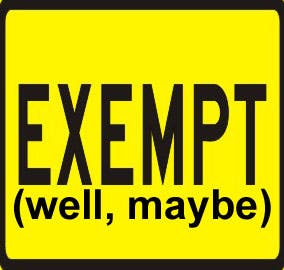As a company that provides human resource consulting to our clients, we see a wide range of mistakes made in the employment relationship.
One of the most common issues we find (and one that can be quite costly) is misclassifying employees as exempt who should be non-exempt.
Sound familiar to you? Business owners get this one wrong fairly often.
Sometimes, it’s an innocent mistake, but other times it’s a deliberate decision made to avoid the potential costs of non-exempt employees; namely overtime wages.
Big penalties if you get it wrong
Exempt vs non-exempt is governed by Fair Labor Standards Act (FLSA) and the U.S. Department of Labor. Detailed information can be found here to answer many questions.
Depending on the job functions of your employees, some of them could be excluded from the statute. A couple of examples are agricultural workers, truck-drivers and some other professions directly governed by other laws. The vast majority of employees in the U.S. are governed by FLSA though, and it’s critical that you classify these employees correctly.
We have seen companies get this wrong and face enormous penalties. Consider how large a penalty could be if you had a number of employees classified as exempt, who should have been paid overtime, over the course of a few years. You would owe back wages (at time and a half) to the employees, and the penalties and interest on the taxes you should have paid could be enough to sink your company.
How to determine exempt vs. non-exempt
Here are the basics on the differences between the two classifications and how to determine whether your employees should be considered exempt or non-exempt.
- What does non-exempt mean? A non-exempt employee needs to be paid at least minimum wage, and must be paid overtime (1.5 times regular rate) for all hours above 40 in a work week. Most U.S. workers fall into this class unless they meet certain requirements to make them non-exempt.
- What does exempt mean? Exempt employees are not protected by FLSA and are not paid overtime wages for any work above 40 hours per week. These employees need to meet the following: Paid at least $23,600 per year ($455 per week), paid on a salary basis, and perform duties that are considered exempt – details below. There are three main categories of exempt duties.
- Executive – An executive exemption is for an employee who supervises two or more employees, has management as the primary duty of the position, and also has genuine input into the job status of other employees.
- Professional – This exemption is for intellectual jobs requiring special education such as doctors, lawyers, architects, teachers, etc. and also involves a degree of discretion and judgement. Creative positions are also included here such as writers, actors and musicians.
- Administrative – The FLSA determines exempt administrative jobs are “office or non-manual work, which is directly related to management or general business operations of the employer or the employer’s customers, and a primary component of which involves the exercise of independent judgement and discretion about matters of significance.”
This is an area that many businesses get wrong and pay a steep penalty. By taking the time to determine the correct status of your employees you will save yourself valuable time, money and headaches.
This was originally published on the Genesis HR Solutions blog.
